21 May2020
By Jerrica Thurman


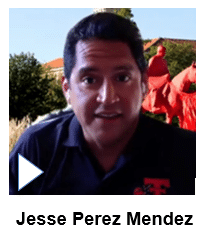
In recent interviews, I met with AACTE Board of Directors to collect their advice for colleges of education to effectively address challenges caused by COVID-19. These videos feature interview participants Jacob Easley II, Jennie Carr, and Jesse Perez Mendez.
18 May2020
By Jerrica Thurman

Will you answer the call to serve the profession? AACTE needs you and has extended the deadlines to volunteer. Be sure to mark your calendar and click on the links below for more information:
- Submission Deadline: May 22, 2020 – If you are a chief representative, please take a few minutes to cast your vote on the recent revisions to the AACTE Articles of Incorporation and Bylaws.
- Submission Deadline Extended: May 27, 2020 – The Call for Reviewers seeks qualified individuals (from AACTE member institutions) interested in reviewing proposals this coming June and July for the 2021 Annual Meeting.
- Submission Deadline: May 29, 2020 – The Call for Standing Committee Nominations invites applications from members with broad and deep experience in educator preparation to serve on an AACTE standing committee for a 3-year term starting March 1, 2021.
- Submission Deadline Extended: June 10, 2020 – The Call for Proposals (open to both members and nonmembers) invites proposals for sessions at the 2021 AACTE Annual Meeting. Acceptance notifications will be sent in late August, and individuals with accepted proposals will be expected to register and attend AACTE’s 73rd Annual Meeting in Seattle, February 26-28, 2021.
- Submission Deadline: June 15, 2020 (for 2021 Outstanding Book Award) – The 2021 AACTE Awards Call for Entries (open to both members and nonmembers) is now open. Applications for the 2021 Outstanding Book Award are currently being accepted.
Simply log in to AACTE’s online submissions site to get started!
15 May2020
AACTE Responds to Coronavirus (COVID-19)
By Jerrica Thurman
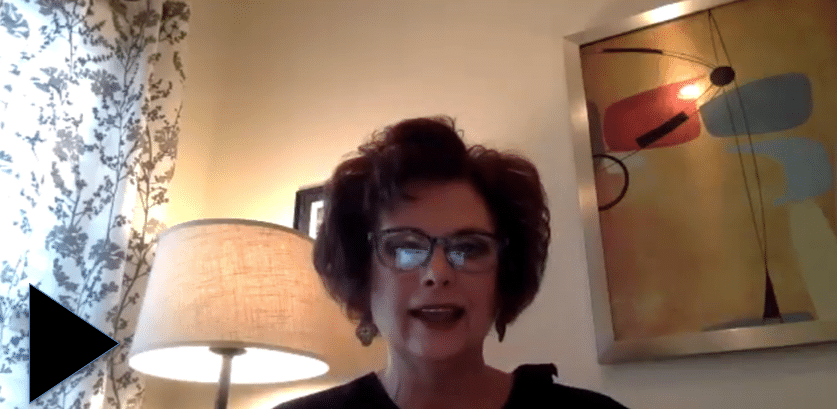
AACTE is spotlighting interviews with its member leaders on effective ways for educator preparation programs to navigate through COVID-19. AACTE Board Chair Ann Larson took time to share important tips in this video on leading in difficult times. She also discusses the leadership role all educators have during the coronavirus crisis.
06 May2020
AACTE Responds to COVID-19
By Jerrica Thurman

AACTE and Mursion have partnered to offer educator preparation programs a solution to an acute need caused by the global pandemic. Teacher candidates’ opportunity for face-to-face classroom training has been suspended, which has resulted in a risk for future teachers to not complete their course work. The AACTE and Mursion collaboration provides virtual reality classrooms for teacher candidates to receive experiential learning through simulations. Mursion is rooted in teacher training and has conducted 50,000 simulations. Through the new offer, AACTE members receive a 10% discount to access innovative technology, thanks, in part, to an anonymous donor underwriting a portion of the cost.
Mursion has worked with over 70 educator preparation programs at colleges and universities. Here’s what a few participants had to say about the benefits of virtual reality classrooms:
05 May2020
By Jerrica Thurman
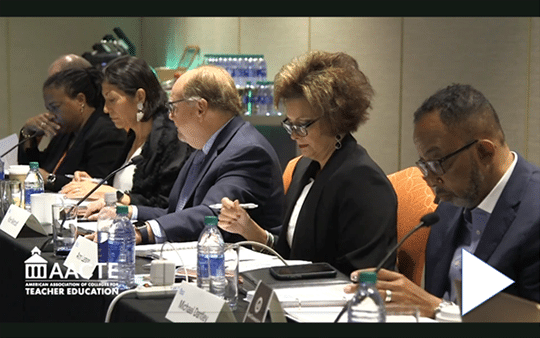
Here is your opportunity to engage with AACTE! The Association is currently accepting 2021 Annual Meeting session proposals and reviewer applications, nominations to serve on AACTE Committees, 2021 award nominations, and voting on revisions to the Association’s bylaws and articles of incorporation. With so many opportunities available, will you answer the call to serve the profession?
Each call to action has its own deadline, so be sure to mark your calendar and click on the links below for more information:
04 May2020
AACTE DEI Video: Promoting Equal Access to Quality Teachers
By Jerrica Thurman
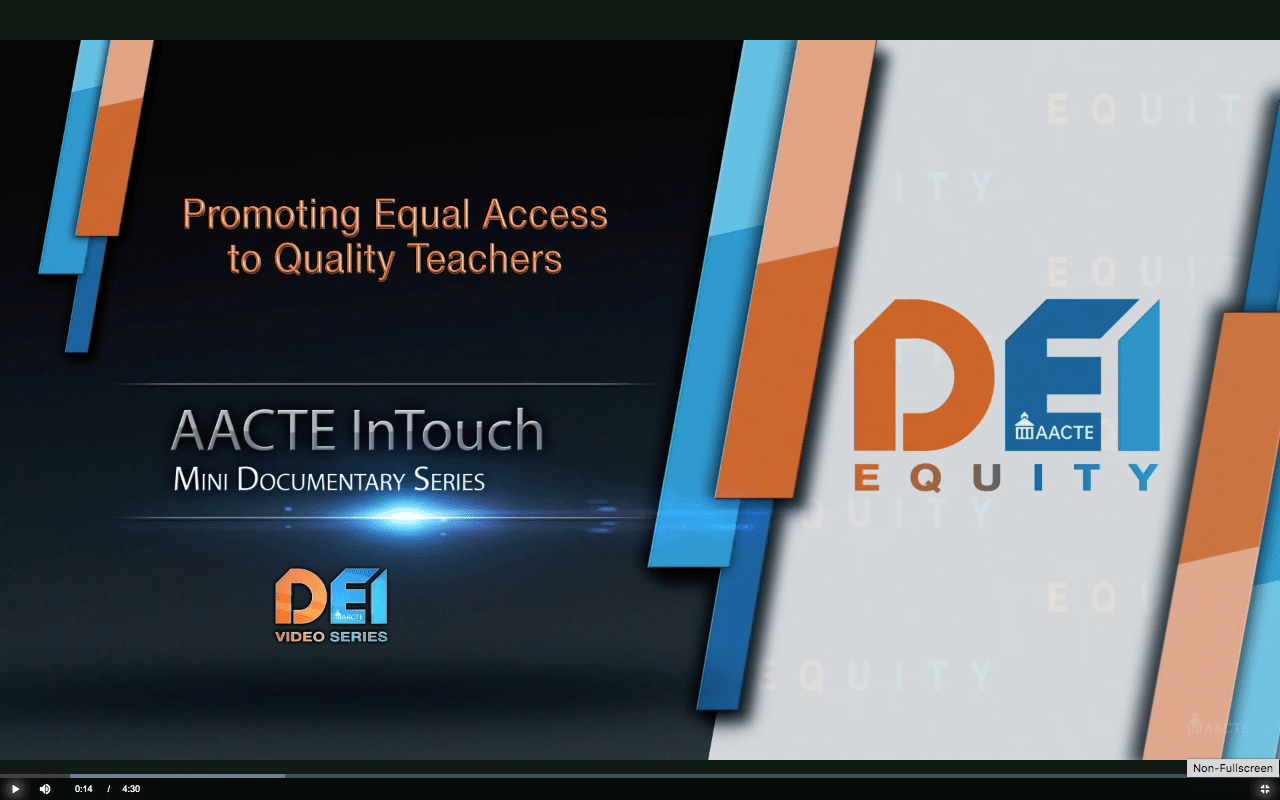
Ed Prep Matters features the “Revolutionizing Education” column to spotlight the many ways AACTE, member institutions, and partners are pioneering leading-edge research, models, strategies and programs that focus on the three core values outlined in the current AACTE strategic plan: Diversity, Equity, and Inclusion; Quality and Impact; and Inquiry and Innovation.
In celebration of National Teacher Appreciation Week, May 4-8, AACTE spotlights “Promoting Equal Access to Quality Teachers,” as the next segment in its Diversity, Equity and Inclusion video series, In this video, AACTE leaders discuss the important role effective teachers have in student learning and achievement, and advocate for poor communities to be given equal access to high quality educators. With the recent disruption in education caused by the coronavirus, several inequities regarding equal access to quality instruction has come to light as well as the important role teachers have in student learning. AACTE members are committed to producing high quality educators for the 21st century learner and strongly believe all students should have access to excellent teachers.
21 Apr2020
AACTE DEI Video: The Importance of Equitable Disciplinary Actions in Schools
By Jerrica Thurman
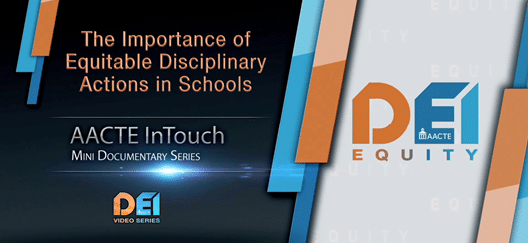
Ed Prep Matters features the “Revolutionizing Education” column to spotlight the many ways AACTE, member institutions, and partners are pioneering leading-edge research, models, strategies and programs that focus on the three core values outlined in the current AACTE strategic plan: Diversity, Equity, and Inclusion; Quality and Impact; and Inquiry and Innovation.
In this segment of the AACTE Diversity, Equity and Inclusion video series, AACTE members promote equitable disciplinary practices for teachers to use as restorative measures to build positive relationships with students. The video segment, The Importance of Equitable Disciplinary Actions in Schools, addresses the importance of eliminating prejudgments so educators can better understand students’ contexts and backgrounds and develop a new lens for addressing disruptive behaviors in schools.
14 Apr2020
AACTE Responds to COVID-19
By Jerrica Thurman

There is only one day left to register for the AACTE and Old Dominion University co-sponsored webinar featuring education faculty advising world nations on COVID-19, Wednesday, April 15 from 2:00 – 3:00 p.m. The 60-minute webinar is open to all AACTE members.
The webinar, “Uncovering Lessons Learned and Strategies for Higher Education During COVID-19 Pandemic,” will feature President and CEO Lynn M. Gangone in an interview with Helen Crompton, associate professor from the Darden College of Education and Professional Studies at AACTE member institution Old Dominion University in Norfolk, VA. She will address pressing questions such as
- How is education being disrupted globally?
- What are lessons learned from China and other countries about how they are managing the impacts of the coronavirus on education?
- What can universities do to improve the social impact and reduce isolation for college students?
- How can universities advance equitable access to online instruction for disadvantaged students?
- What are best practices for faculty transitioning to teaching online?
- What are recommended education technology tools and other resources to help stay connected with students?
09 Apr2020
AACTE Responds to COVID-19
By Jerrica Thurman
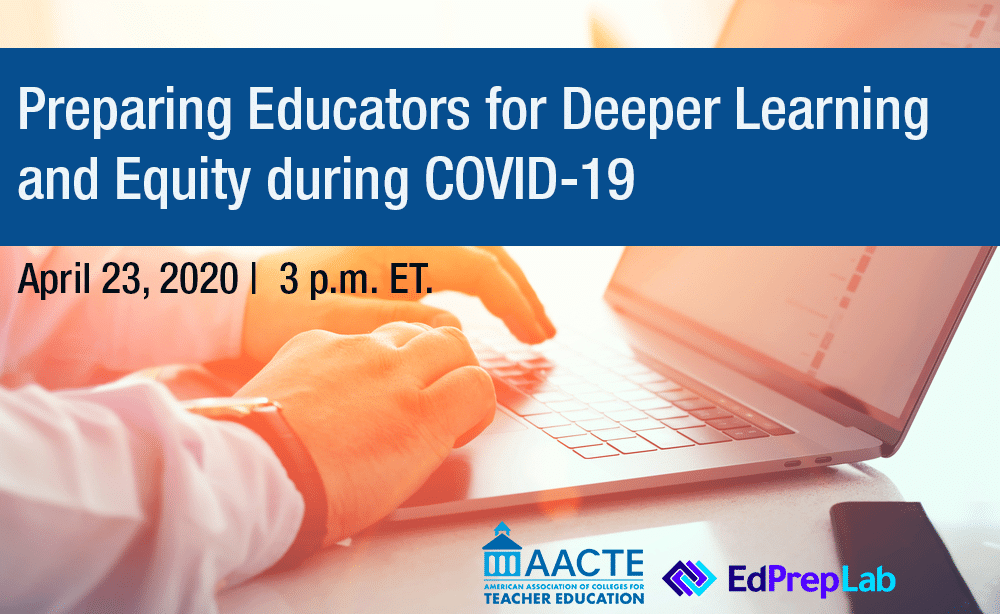
AACTE and the Educator Preparation Laboratory will present, “Preparing Educators for Deeper Learning and Equity during COVID-19,” on Thursday, April 23, 3 – 4 p.m. ET. This webinar features leaders from preparation programs around the country who are members of the Educator Preparation Laboratory network, an initiative of the Learning Policy Institute and Bank Street Graduate School of Education.
As school districts and universities across the nation adapt to distance learning, how are educator preparation programs responding? How are they meeting their candidates’ needs right now? What are they doing to prepare for the future? In this climate of uncertainty, it is more important than ever to ensure teachers and leaders are being prepared to provide deeper learning opportunities to all students, especially those from our most vulnerable populations. During the webinar, the presenters will explore pressing questions around teacher and leader preparation during the COVID-19 crisis, including:
07 Apr2020
AACTE Responds to Coronavirus
By Jerrica Thurman
In recent interviews, AACTE Director of Marketing and Communications Jerrica Thurman met with six members of the AACTE Board of Directors to discuss how they are managing their university’s response to COVID-19. The interview participants were Patricia Alvarez-McHatton, Marquita Grenot-Scheyer, Robert Floden, Dale-Elizabeth Pehrsson, Carine Feyten, and Monika Shealey.
All participants were asked, what words of advice or lessons learned would you share with other university leaders or college deans about what you have experienced so far in your crisis response planning for the coronavirus? Here’s what they had to say:
 Patricia Alvarez-McHatton
Patricia Alvarez-McHatton
Executive Vice President for Academic Affairs
University of Texas, Rio Grande Valley
“We have our academic affairs leadership team in which we bring all the chairs, directors, and deans together on a monthly basis. It just so happened, fortuitously, that our March meeting was scheduled prior to when this all began. We placed participants in heterogeneous groups and had them respond to five guiding questions about things to think about should this situation materialize as it has. I think it brought people together. It generated an awakening and understanding of the things that we need to think about. We were able to learn from each other. It became clear that first and foremost we need to empower and have faith in our faculty’s ability to do what needs to be done.
07 Apr2020
By Jerrica Thurman

AACTE continues to seek opportunities to support its members in navigating through the unprecedented educational challenges the coronavirus has caused. It is exciting to discover how AACTE members are exploring innovative pathways and solutions to the complex problems and are eager to share with the educator preparation community. Next week, AACTE and Old Dominion University will co-sponsor a 60-minute webinar featuring education faculty advising world nations on COVID-19, Wednesday, April 15 from 2:00 – 3:00 p.m. The webinar is open to all AACTE members.
06 Apr2020
AACTE Responds to COVID-19
By Jerrica Thurman
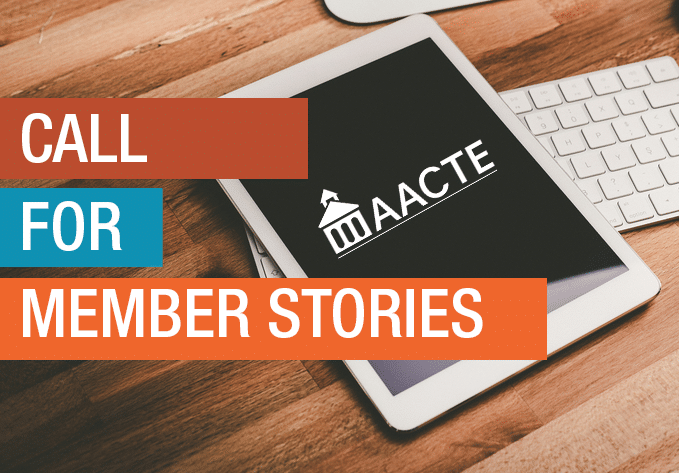 AACTE is committed to providing opportunities for its members to connect virtually during the coronavirus. One of the several initiatives the Association recently launched to support members in this outbreak is the opportunity to share their stories with the educator preparation community. In fact, AACTE has a dedicated section for “Member Voices” on its new online COVID-19 Resource Hub.
AACTE is committed to providing opportunities for its members to connect virtually during the coronavirus. One of the several initiatives the Association recently launched to support members in this outbreak is the opportunity to share their stories with the educator preparation community. In fact, AACTE has a dedicated section for “Member Voices” on its new online COVID-19 Resource Hub.
AACTE is currently accepting article submissions from members that address questions such as: What lessons have you learned during the crisis response planning process for your institution? What innovations are your programs using to adapt to the needs of your faculty, staff and students? How has the impact of the coronavirus helped you enhance as an education leader?
Article submissions should also address education topics related to the following categories:
17 Mar2020
By Jerrica Thurman

The AACTE 2020 Annual Meeting Opening keynote speaker Robin DiAngelo, associate professor of education at the University of Washington, is widely recognized for her research in critical discourse analysis and whiteness studies. In her address, she explored how to implement strategic, intentional anti-racist actions to interrupt the system of racism in education. Her message aligns with AACTE’s core value of diversity, equity, and inclusion an integral part of AACTE’s strategic plan for 2020-23.
“The status quo of this society is racism; it is not an aberration, it’s the norm. All of our institutions effectively and efficiently reproduce racial inequality and schools are the bellies of the beast,” said DiAngelo. She noted that the concept examining the dominant culture is consistently left off the table in the conversation when discussing race issues. These discussions tend to focus on learning about other racial groups.
During her talk, she emphasized the need to decenter “whiteness” by naming it and exposing it, explaining that there is a white worldview, a white frame of reference that allowed her to move through the world from a white experience. DiAngelo shared, “Being white, I was not raised to see myself in racial terms” She reasoned that as a white person, “when we talk about race it’s about their race not mine.” She acknowledged the complexities of racism and the inability to understand every nuance. “But it’s on me to get that information, not on people of color to hand it to us.”
10 Feb2020
By Jerrica Thurman
 AACTE has chosen an article by Amy Rector-Aranda, Ph.D. of Texas A&M University, the recipient of the 2020 AACTE Outstanding Journal of Teacher Education Article Award. Her article, “Critically Compassionate Intellectualism in Teacher Education: The Contributions of Relational-Cultural Theory,” was published in the September/October 2019 issue of the journal and will be recognized formally with the award at the AACTE 72nd Annual Meeting, February 28 – March 1, in Atlanta, GA.
AACTE has chosen an article by Amy Rector-Aranda, Ph.D. of Texas A&M University, the recipient of the 2020 AACTE Outstanding Journal of Teacher Education Article Award. Her article, “Critically Compassionate Intellectualism in Teacher Education: The Contributions of Relational-Cultural Theory,” was published in the September/October 2019 issue of the journal and will be recognized formally with the award at the AACTE 72nd Annual Meeting, February 28 – March 1, in Atlanta, GA.
In the article, Rector‐Aranda explores how the critically compassionate intellectualism framework might translate as a framework for teacher education. Educational theorists Cammarota and Romero describe critically compassionate intellectualism (CCI) as a trilogy of critical pedagogy, authentic caring, and social‐justice oriented curriculum used to lift up previously disempowered Latinx youth. Because the compassion element in CCI is understudied in teacher education, yet crucial to the success of the framework as a whole, Rector‐Aranda applies the tents of Relational‐Cultural Theory (RCT) to enhance understandings of this component. Based in feminist theories of psychosocial and moral development, RCT expands the original framework to account for varied experiences of privilege and vulnerability when applying CCI to teacher education while retaining core emphases on relationships, empathy, and associate aspects of authentic caring. This study makes a conceptual contribution by offering an integrated framework for teacher education.
10 Feb2020
By Jerrica Thurman
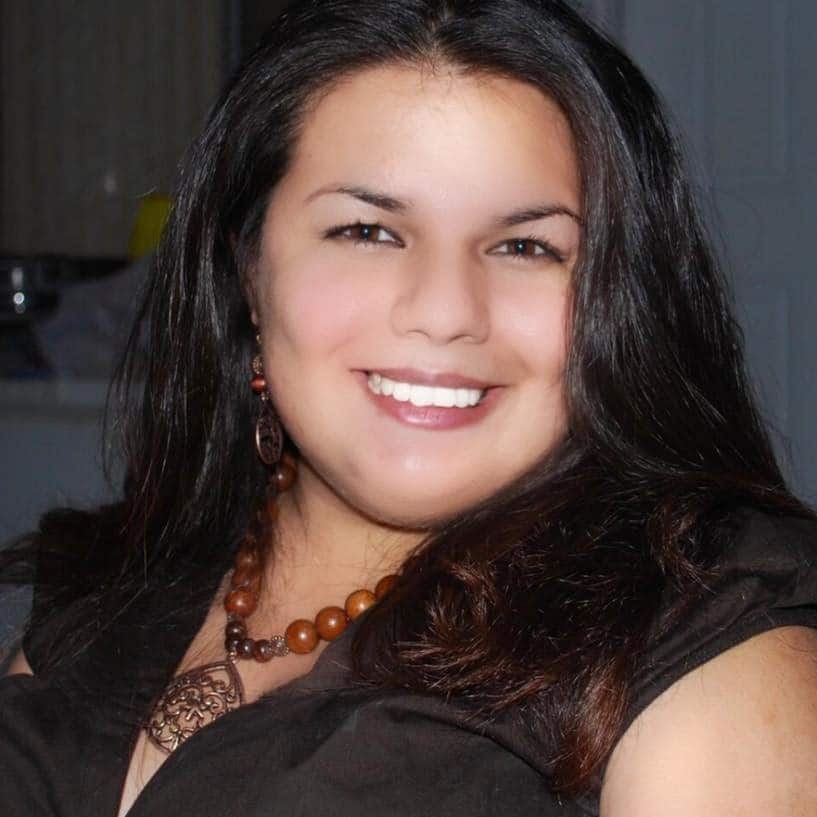 AACTE is delighted to announce Christina Restrepo Nazar, Ph.D. as the recipient of the 2020 AACTE Outstanding Dissertation Award for Youth as Teacher Educators: Supporting Preservice Teachers in the Developing Youth Centered, Equity-Oriented Science Teaching Practices. The author completed her dissertation for the Ph.D. at Michigan State University College of Education. She currently serves as assistant professor of K-12 science education in the Charter College of Education at California State University Los Angeles. She will be recognized formally with the award at the AACTE 72nd Annual Meeting, February 28 – March 1, in Atlanta, GA.
AACTE is delighted to announce Christina Restrepo Nazar, Ph.D. as the recipient of the 2020 AACTE Outstanding Dissertation Award for Youth as Teacher Educators: Supporting Preservice Teachers in the Developing Youth Centered, Equity-Oriented Science Teaching Practices. The author completed her dissertation for the Ph.D. at Michigan State University College of Education. She currently serves as assistant professor of K-12 science education in the Charter College of Education at California State University Los Angeles. She will be recognized formally with the award at the AACTE 72nd Annual Meeting, February 28 – March 1, in Atlanta, GA.
In her dissertation, Restrepo Nazar conducted three separate, but interrelated studies that examine the ways preservice teachers (PSTs) generatively developed youth-centered, equity-oriented pedagogical imaginaries in their methods courses and how they enacted these practice(s) in their field experiences. The purpose of this dissertation is to understand how and in what ways a science methods course can support PSTs in the critical uptake of youth (and community) knowledge(s) and practice(s) and how classroom communities in the field can shift/shape these enactments. In this work, Restrepo Nazar foregrounds youth counternarratives of the culture of power in science as a critical part of learning to teach science for PSTs—a study that has never been done before.


















 Patricia Alvarez-McHatton
Patricia Alvarez-McHatton AACTE is committed to providing opportunities for its members to connect virtually during the coronavirus. One of the several initiatives the Association recently launched to support members in this outbreak is the opportunity to share their stories with the educator preparation community. In fact, AACTE has a dedicated section for “Member Voices” on its new online
AACTE is committed to providing opportunities for its members to connect virtually during the coronavirus. One of the several initiatives the Association recently launched to support members in this outbreak is the opportunity to share their stories with the educator preparation community. In fact, AACTE has a dedicated section for “Member Voices” on its new online 
 AACTE has chosen an article by Amy Rector-Aranda, Ph.D. of Texas A&M University, the recipient of the 2020 AACTE Outstanding Journal of Teacher Education Article Award. Her article, “
AACTE has chosen an article by Amy Rector-Aranda, Ph.D. of Texas A&M University, the recipient of the 2020 AACTE Outstanding Journal of Teacher Education Article Award. Her article, “ AACTE is delighted to announce Christina Restrepo Nazar, Ph.D. as the recipient of the 2020 AACTE Outstanding Dissertation Award for Youth as Teacher Educators: Supporting Preservice Teachers in the Developing Youth Centered, Equity-Oriented Science Teaching Practices. The author completed her dissertation for the Ph.D. at Michigan State University College of Education. She currently serves as assistant professor of K-12 science education in the Charter College of Education at California State University Los Angeles. She will be recognized formally with the award at the
AACTE is delighted to announce Christina Restrepo Nazar, Ph.D. as the recipient of the 2020 AACTE Outstanding Dissertation Award for Youth as Teacher Educators: Supporting Preservice Teachers in the Developing Youth Centered, Equity-Oriented Science Teaching Practices. The author completed her dissertation for the Ph.D. at Michigan State University College of Education. She currently serves as assistant professor of K-12 science education in the Charter College of Education at California State University Los Angeles. She will be recognized formally with the award at the